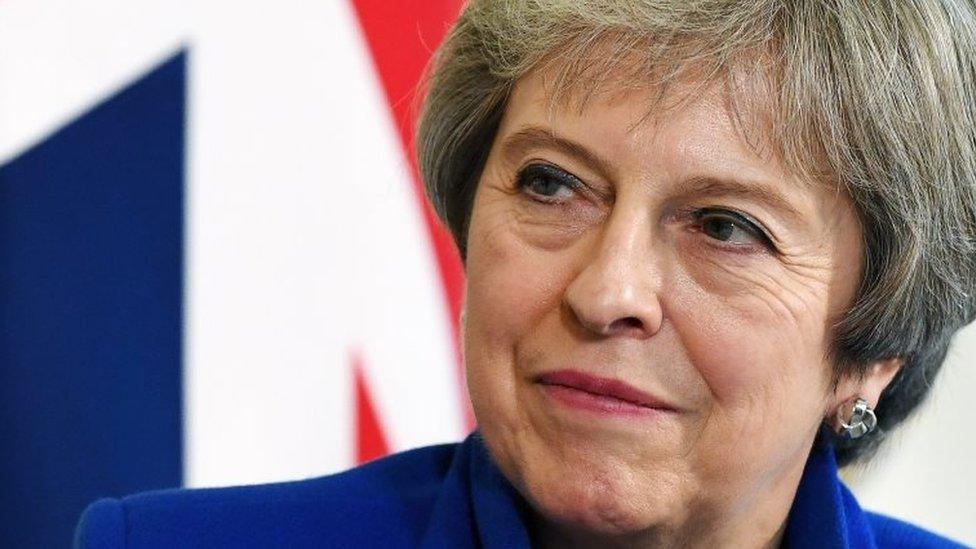10 pointers on where we are with Brexit
- Published
- comments

"I hadn't intended to mention the 'B' word," Theresa May joked on Monday night at a reception in Westminster, before going on to talk about how in her view Brexit gives the government a big chance to reform the country.
It's true that it's an opportunity for change, if she and her colleagues can avoid damaging turmoil at the same time, if Brexit is not to become the kind of rather rude word her phrase tonight normally refers to.
At the risk of writing what I have written on several occasions here before, we are at the stage in the talks where a deal could all suddenly come together.
Or it could all, as a couple of weeks ago, fall apart.
Until the phone rings or WhatsApp buzzes to say it's suddenly on or off, here are a few pointers on the state of play.
Sometimes in a confusing situation, there's nothing better than making a list even though, of course, there's no way all the complexities can be captured here. So…..
Ministers are still working for a deal to get done in November. There is a window from about the 17th until the end of the month where a summit could take place to get it signed off. There are logistical reasons that mean a summit can't be planned at the very last minute, but it doesn't have to be huge progress in the next 24 hours, or the next 48. There could be movement towards the back end of next week and a special EU summit could still happen on the 26th and 27th of November.
Time is getting tighter and tighter. But if a deal isn't done in November, it is still possible for it to be done in December. It makes it extremely tough for the UK government to get everything through Parliament in time. But it could be done. And it's not the policy of the government that it's November or nothing.
Cabinet tomorrow (Tuesday) is not expected to be a meeting where a final decision is made, even though some people around government would like it to be. There is real suspicion on the Brexiteer side that the PM will at some point try to bounce them into a decision without much discussion beforehand. But on the other side, some former Remain voices think Theresa May should call the bluff of those who are making it hard. In a sign that the former Remainers in the Cabinet are starting to present their own pushier front, Chancellor Philip Hammond, the PM's second-in-command David Lidington and Business Secretary Greg Clark met tonight (Monday) ahead of tomorrow's get together.
The Irish border is still the biggest sticking point, although the EU has conceded the principle (after saying it couldn't happen) that a UK-wide customs agreement can be somehow written into the divorce deal as the backstop - remind yourself what that's all about here. The points of dispute are the "temporariness" - or not - of the UK backstop and how you get out of it. Ministers like Dominic Raab say it has to have finality or a time limit, and the UK has to be able to make that decision on its own. But given that the EU side demands something that would be legally binding, permanent and a joint decision - how can those two positions be reconciled? There is a suggestion of a "review mechanism" - where both sides would look at how it was working every now and then - maybe something like a sunset clause that's occasionally pulled out in Westminster to get controversial legislation through.
But - it's never just been about the technicalities - those involved in the talks say while there are lots of theoretical ways you can come up with language and methodology to do that, this is also about trust, politics and principle. This is a big problem, on both sides.
It seems now that there are pretty constant conversations going on between ministers, officials and politicians about getting this over the line. Theresa May is also holding fairly regular conference calls with the inner Cabinet, as well as normal meetings. No surprise, Olly Robbins, Mrs May's chief Brexit adviser, often dials in to these meetings from Brussels. At various stages in this process it has felt like there isn't much going on. That is not where it feels we are at now.
Ireland is by far the biggest problem. But there are still other points of tension in the talks about the withdrawal agreement, over what's known as the "level playing field" - the EU is keen that the UK doesn't somehow depart wildly from the rest of the continent in ways that gives it enormous competitive advantages.
There has been a fair amount of progress on what's now known as the "outline political declaration" - the document that's meant to emerge too, that sketches out the long term vision of the relationship for decades and decades to come.
But if the two sides, and the Cabinet, can't find a civil agreement on the divorce deal, finding a way of having friendly relations in the future smack up against a whole new challenge.
And remember, if there is a deal there's no guarantee it gets through Parliament. Perhaps it's rather easy to understand why the prime minister might call it "the B word" after all.